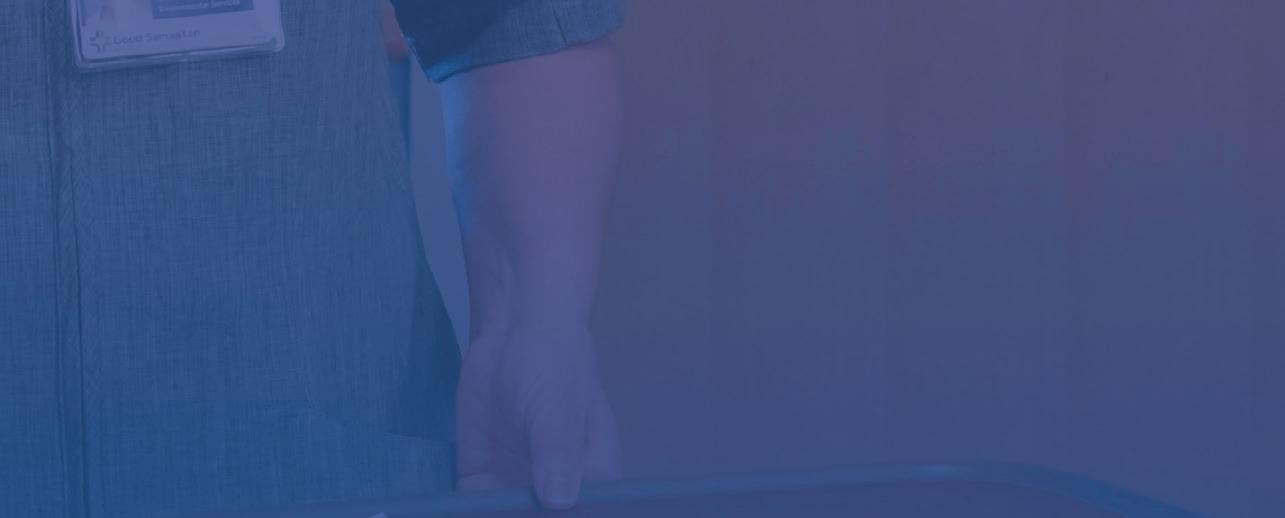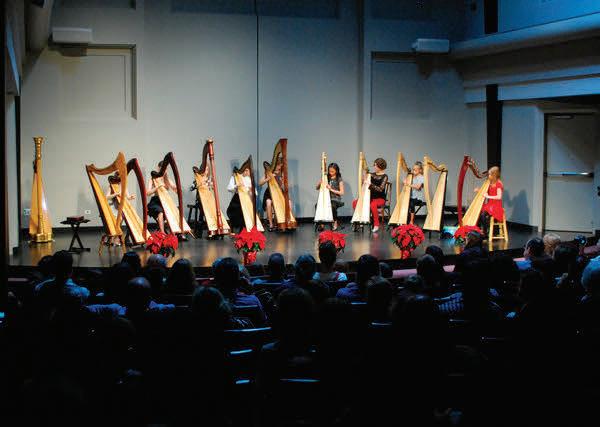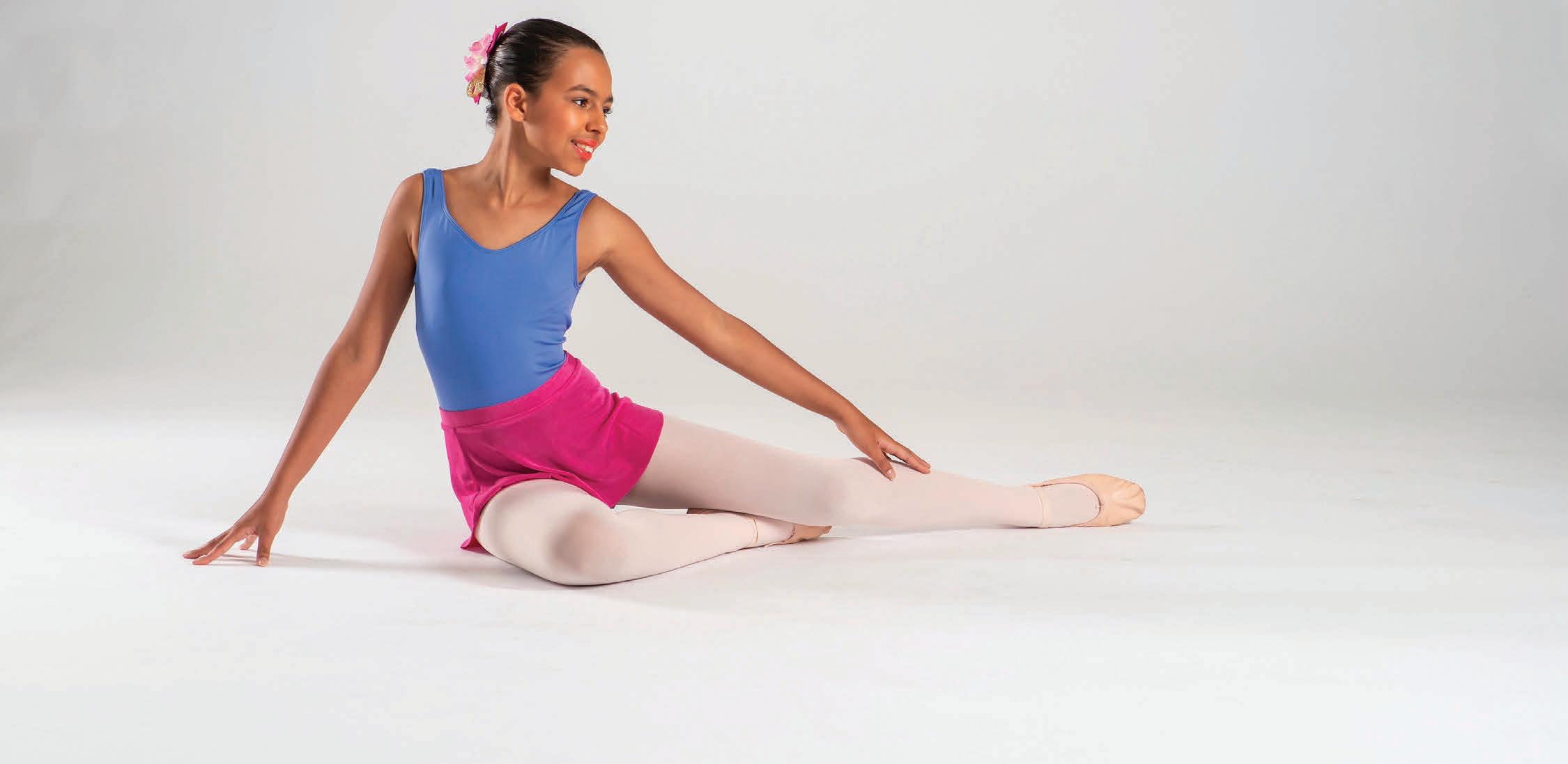


































“Everyone, including kitchen staff and housekeepers, made me feel at ease, made me laugh,and put a smileon my face.
Good Sam Patient




































“Everyone, including kitchen staff and housekeepers, made me feel at ease, made me laugh,and put a smileon my face.
Good Sam Patient





than just muscles.
take care










Friends,

Welcome to the 65th Anniversary Season of your Boulder Philharmonic Orchestra! We are delighted that you have joined us for an evening of great music. Premieres, classics, holiday celebrations, and world-class performers fill our entire 202223 season. Maestro Butterman has planned a remarkable year filled with innovative programming and a commitment to orchestral excellence that makes us one of the finest regional orchestras in the country!
Highlights for the 2022-2023 season include a Colorado premiere of Jennifer Higdon’s Suite from Cold Mountain, DoubleBassist extraordinaire Xavier Foley’s Boulder Phil debut, Mozart Violin Concerto No. 5 with Concertmaster Charles Wetherbee, world premieres of Drew Hemenger’s Ozymandias: To Sell A Planet and Leigha Amick’s Resound Boulder Commission, Bruch’s Scottish Fantasy with violinist Stefan Jackiw, and Bruckner’s monumental Symphony No. 7. We are especially pleased to present the inaugural performance of the Boulder Phil Chorus under the direction of Dr. Gregory Gentry, as well as the return of Boulder’s favorite holiday tradition: The Nutcracker with Boulder Ballet.

Our impact will continue to extend beyond the concert hall throughout the year. The 2022-23 season includes Stories & Music: chamber music programs at local libraries; Nature & Music: guided hikes with naturalist Dave Sutherland and musicians from the orchestra; our ever-popular Discovery Concerts at Macky Auditorium for local elementary school students; and our Early Explorers Program at Boulder County Head Start. For a more intimate musical experience, we offer The Events of Note Series featuring recitals by guest artists in smaller venues and private residences.
As we celebrate this 65th-Anniversary season together, we want to thank you for being a part of our audience. We rely on your generous donations and ticket purchases to continue to expand our work in the community and further our mission to build community through music. Thank you for making it happen!
SARA PARKINSON EXECUTIVE DIRECTOR RONNY WELLS PRESIDENT OF THE BOARD
RONNY WELLS PRESIDENT OF THE BOARD

Enjoy the music!
As one of Colorado’s premier ensembles, the Boulder Phil is a critically acclaimed professional orchestra serving Boulder and the greater metroDenver region. Known for innovative concert programming presented at the highest artistic level and a growing commitment to authentic community engagement, the Boulder Phil continues to push the boundaries of what it means to be Boulder’s orchestra.
We are defined by the artistry of our talented musicians, the support of our extraordinary patrons, and ongoing creative collaborations with partner organizations encompassing the arts, sciences, nature, youth, and social services. We strive to present once-in-a-lifetime performances, inspire the next generation with school-age education programs, and pioneer community-focused projects that bring music to all.
It is the mission of the Boulder Philharmonic Orchestra to enhance the Boulder region’s artistic and educational cultures through orchestral excellence, embracing diversity, and connecting people to music, music to ideas, and people to people.

Raymond Wells, President
Steve Miller, Vice President
Adrianne Tracy, Treasurer
Charlotte Roehm, Secretary
Jessica Bauters
Michael Butterman, ex officio David Crowe

Claire Figel David Fulker


Marilyn Gallant
Judy Knapp
Erma Mantey
Sara Parkinson, ex officio
Harry Poehlmann
David Rothman
Karyn Sawyer
Leslie Scarpino
Sara Parkinson, Executive Director
Aspen McArthur, Director of Artistic Administration
Fernanda Nieto, Director of Education & Community Engagement
Chris Morse, Patron Services Manager

Sam Headlee, Personnel Manager & Orchestra Librarian
DeAunn Davis, Education & Development Assistant



Adam Snider & Chris Martin, Production Managers

Rosie Harris, Marketing & Communications Manager
magazine
Olivia Lerwick, Marketing Assistant
Angie
www.coloradoartspubs.com



Angie Flachman Johnson Publisher

Stacey Krull Production Manager
Sandy Birkey
Graphic Designer




Wilbur E. Flachman
President Emeritus
more than 132 years, the Daily Camera and our family of publications have been covering Boulder County’s news and supporting our community.

Our more than 25 news and niche publications are the No. 1 sources for local information and advertising in the markets they serve. Our ever-evolving formats – print, e-edition, mobile, desktop, social and email platforms – ensure our audiences continue to grow.
In short, we’re Boulder County’s go-to source for local news, information and advertising.



We encourage you to read one of our many local products. To put us to work for your business, call 303.473.1400 or email jill@dailycamera.com


Music Director of four American orchestras and a sought-after guest conductor, Michael Butterman is acclaimed for his creative artistry and innovative programming. Foundational to his dynamic career is a deep commitment to audience development and community engagement. He is the Music Director of the Boulder Philharmonic Orchestra, which he has led to national prominence, resulting in an invitation to open the Kennedy Center’s inaugural SHIFT Festival of American Orchestras in 2017, as well as the Shreveport Symphony, which has experienced an unprecedented era of artistic growth under his leadership. Beginning with the 2022-2023 season, Mr. Butterman assumes the role of Music Director of the Williamsburg Symphony and Lancaster Symphony orchestras, as well.
As a guest conductor, Mr. Butterman has led many of the country’s preeminent ensembles, including the Cleveland Orchestra, Philadelphia Orchestra, National Symphony, Detroit Symphony, and Houston Symphony. Other recent appearances include performances with the Fort Worth Symphony, Colorado Symphony, Oregon Symphony, Phoenix Symphony, Kansas City Symphony, Louisiana Philharmonic, and Victoria Symphony (British Columbia). Summer appearances include Tanglewood, the Bravo! Vail Valley Music Festival, Colorado Music Festival, and the Wintergreen Music Festival in Virginia. Guest appearances this season include Cuba’s renowned Havana Chamber Orchestra, in collaboration with pianist/composer Aldo López-Gavilán.
A passionate advocate for music education, Mr. Butterman was the founding Music Director of the Pennsylvania Philharmonic, and recently completed a 19-year association with the Rochester Philharmonic Orchestra as its Principal Conductor for Education and Community Engagement. Concurrently he enjoyed a 15-year tenure with the Jacksonville Symphony, first as Associate, and then as Resident Conductor.
Mr. Butterman gained international attention as a diploma laureate in the Prokofiev International Conducting Competition and as a finalist in the prestigious Besançon International Conducting Competition. Michael Butterman’s prolific work has been featured in more than a dozen nationwide broadcasts on public radio’s Performance Today. He can be heard on two CDs recorded for the Newport Classics label and on an album in which he conducts the Rochester Philharmonic and collaborates with actor John Lithgow.
Arapahoe Ave, Suite #102 Boulder, CO 80303

2425 Colorado Ave
Boulder, CO 80302 saintaidans.org
Boulder Library Foundation funds more than 90% of the library's programs, events and activities. Join us today to support a community of lifetime learning and participation.
Boulder Library Foundation funds more than 90% of the library's programs, events and activities. Join us today to support a community of lifetime learning and participation.
Boulder Library Foundation funds more than 90% of the library's programs, events and activities. Join us today to support a community of lifetime learning and participation.


Save the date for our BLF Fall Gala, November 17 www.boulderlibraryfoundation.org
Save the date for our BLF Fall Gala, November 17 www.boulderlibraryfoundation.org
Save the date for our BLF Fall Gala, November 17 www.boulderlibraryfoundation.org

Our Education and Engagement Programming brings new and diverse musical experiences to more than 10,000 people from across Boulder County and beyond. Our robust educational programs continue to connect, inspire, and enrich people of all ages through music. Boulder Phil is grateful for the generous support of individuals, organizations, and communities that make these programs possible.

Providing an exhilarating field trip opportunity for 3rd-6th graders
Presenting dynamic visits from our string quartet and brass quintet to local schools
Creating learning opportunities within our schools with music director and conductor Michael Butterman
Bringing music, nature, and community together
Promoting music learning through movement in preschools
Fostering connection and engaging audiences through music & stories
Mentoring high school and youth orchestra students on stage AND MORE!
For more information, contact Director of Education and Community Engagement Fernanda Nieto at fernanda@boulderphil.org

Michael Butterman, Conductor and the inaugural performance of the BOULDER PHILHARMONIC CHORUS
Gregory Gentry, Chorus Master
Saturday, October 8, 2022
Macky Auditorium, CU Boulder • 7:00 pm Performance
Michael Abels Global Warming 9’ (B. 1962)
Drew Hemenger
Ozymandias: To Sell a Planet | World Premiere 25’ (B. 1969)
I. The Spring Is Come
II. The World Is Too Much With Us
III. Migeloti [ma-jee-lō-ta]
IV. Sell a Country?
V. Ozymandias
— Intermission —
W. A. Mozart Overture from Don Giovanni 6’ (1756-1791)
R. Wagner
Trauermusik from Götterdämmerung 10’ (1813-1883)
R. Strauss Don Juan, op. 20 19’ (1864-1949)
Total performance duration 01:25 • There will be one 15-minute intermission for this concert.
Program and artists are subject to change. There may be professional photographers and recording crew present during our performances.
All other photography or recording of any kind is strictly prohibited.
The Boulder Philharmonic Orchestra acknowledges that this land lies within the territories of the Ute, Cheyenne, and Arapaho peoples. Further, we acknowledge that 48 contemporary tribal nations are historically tied to the lands that make up the state of Colorado.
Thanks to our concert sponsors: Ruth & Richard Irvin City of Boulder’s Climate Initiatives
American tenor Matthew Plenk holds a Bachelor’s degree from the Hartt School of Music, a Master’s degree from Yale University, and is a Samling Scholar. He is a graduate of the Metropolitan Opera’s Lindemann Young Artist Development Program, and has sung several roles with the company, including Arturo in Lucia di Lammermoor, Tamino in The Magic Flute, and Janek in The Makropulos Case.
Matthew’s upcoming and most recent appearances include the world premiere of Drew Hemenger’s Ozymandias – To Sell a Planet with the Boulder Philharmonic, Nemorino (L’elisir d’amore) and Alfred (Die Fledermaus) with Central City Opera, Bruckner’s Te deum and Beethoven’s 9th Symphony with the Colorado Symphony, and Die Schöne Müllerin with Keith Ward at the University of Denver.

During the 20-21 season, Matthew was scheduled to return to the Cleveland Orchestra, Denver Philharmonic (Donizetti, Beethoven, Mozart), and debut with the Rogue Valley Symphony – all cancelled due to the COVID-19 pandemic.
Matthew Plenk has been seen on the operatic stages of Los Angeles Opera, Opera Theatre of St. Louis, Virginia Opera, Atlanta Opera, Boston Lyric Opera, Lyric Opera of Kansas City, and Des Moines Metro Opera. In concert, he has appeared with the Cleveland, Boston, Philadelphia and Minnesota Orchestras, the Los Angeles Philharmonic, Orchestra Sinfonica Nazionale della RAI, Baltimore, Houston, Colorado and Hartford Symphonies, University Musical Society, Aspen Music and La Jolla Summerfest festivals, and with the Orchestra Sinfonica di Milano Giuseppe Verdi.
Amongst a number of awards and recognitions, he was a Grand Finalist in the 2007 Metropolitan Opera National Council Auditions. Matthew Plenk is the Artistic Director of Lamont Opera Theatre at The University of Denver’s Lamont School of Music, where he also serves Assistant Professor of Voice.

Gregory Gentry is Director of Choral Studies at the University of Colorado-Boulder. His new book, In
Search of Inspiration: Interviews with Notable Choral Conductors (2021), is published by GIA Publications.
As a published editor, The Gregory Gentry Choral Series (Fred Bock Publishers) is distributed by Hal Leonard Corporation and features reviving select historic choral octavi by Cecil Effinger, George Lynn, Wray Lundquist, and Roy Harris.
Dr. Gentry is the founding Chorus Master of the new Boulder Philharmonic Chorus. A skilled interpreter of new works, Gentry conducted the world premiere of Reflections on a Mexican Garden by Colorado composer Kevin Padworski at Carnegie Hall in 2018. Gentry is the former Phoenix Symphony Chorus Master where he prepared many major choral/orchestral masterworks, including Puccini’s Messa di Gloria (2012), North American premiere of In Principio by Arvo Pärt (2011), On the Transmigration of Souls (2010) and Nixon in China (2009) by John Adams, the world premiere of Mark Grey’s Enemy Slayer: A Navajo Oratorio (2008) with an English/Navajo libretto, and the Arizona premiere of Osvaldo Golijov’s Ainadamar in collaboration with Dawn Upshaw and Kelley O’Connor (2008). Gentry also made his Phoenix Symphony conducting debut in 2009 to sold-out audiences with Stravinsky’s Symphony of Psalms.
In addition to guest conducting appearances across the country, Gentry’s collegiate choirs have performed at
conferences for the American Choral Directors Association, National Collegiate Choral Organization, Music Educators National Conference, Colorado Music Educators Association, Arizona Music Educators Association, Society for American Music and College Music Society.
He is the founder of Southwest Liederkranz, an intimate symposium for select choral professionals, where Kirke Mechem, Morten Lauridsen, Jaakko Mäntyjärvi, Vance George, Dale Warland, Maria Guinand, Eph Ehly, Gary Packwood and others have, to date, been invited to share their knowledge, wisdom, humor, and varying inspirations.
Michael Abels is best-known for his scores for the Oscar-winning film GET OUT, and for Jordan Peele’s US, for which Abels won the World Soundtrack Award, the Jerry Goldsmith Award, a Critics Choice nomination, an Image Award nomination, and multiple critics awards. The hip-hop influenced score for US was shortlisted for the Oscar, and was even named “Score of the Decade” by online publication The Wrap.

As a concert composer, Abels has received grants from the National Endowment for the Arts, Meet The Composer, and the Sphinx Organization, among others. His orchestral works have been performed by the Chicago Symphony, the Cleveland Orchestra, the Atlanta Symphony, the Philadelphia Orchestra, and many more. As guest conductor of GET OUT IN CONCERT, Abels has led orchestras like the National Symphony and the San Francisco Symphony. Several of his orchestral works have been recorded by the Chicago Sinfonietta on the Cedille label, including Delights & Dances and Global Warming. Abels is co-founder of the Composers Diversity Collective, an advocacy group to increase the visibility of composers of color in film, game and streaming

media. Upcoming projects include the ballet for concert band FALLING SKY for Butler University, AT WAR WITH OURSELVES for the Kronos Quartet, and the Hugh Jackman film BAD EDUCATION for HBO.
Emerging as a composer with a unique, yet quintessentially American voice, Drew Hemenger’s music has been heard all over North America and Europe, as well as across the globe in Russia, Asia and Australia. His music has been performed in venues ranging from Carnegie Hall and Lincoln Center to intimate churches in the Midwest. A highly sought-after artist, Drew has been commissioned by The AIDS Quilt Songbook @ 20, The Auros Ensemble, Boulder Philharmonic, Chamber Music Yellow Springs, Duo Con Forza, the Goldman Memorial Band, The Jones & Maruri Cello/Guitar Duo, The Lively Arts at Indiana University of Pennsylvania, Orion Ensemble, pianists Pascal and Ami Rogé, Rogue Valley Symphony, Symphony New Hampshire, and the University of Texas at Austin.
Winner of Boston University’s 1996 ALEA III International Composition Competition, Hemenger’s residencies and fellowships include the Virginia Center for the Creative Arts, the Banff Centre, Omi International Arts Center, and the Bowdoin and Aspen Music Festivals. He has served as Composer-in-Residence for the New York-based dance company, RamosDance. Hemenger is also a regular speaker at prestigious educational institutions, such as the Curtis Institute of Music, Pace University, The Juilliard School, and the University of Pennsylvania, on a range of topics including artist management, individual entrepreneurship, and career development for performing artists and arts administrators.
Hemenger earned a Bachelor’s degree in Trumpet Performance from Ohio Wesleyan University, after which
Photo: Eric Schwabelhe studied composition at The Juilliard School with Stanley Wolfe. His Master’s and Doctoral degrees are from the Manhattan School of Music where he studied principally with Richard Danielpour. Other teachers and mentors include George Crumb, David Del Tredici, Sebastian Currier, and Robert Beaser.
As part of an ongoing collaboration with operatic soprano Adrienne Danrich, Mr. Hemenger has composed a series of songs on the poetry of Langston Hughes. A recording of this series, performed by Danrich and pianist Mila Henry, is expected to be released in early 2023. Other ongoing projects include an opera based on Anne Sexton’s play Mercy Street, with librettist David Johnston.
Hemenger’s music is published by Seemsa (Madrid), LK Drew Publishing, and Drew Hemenger Music. He is represented by Black Tea Music.
instruments provide shimmering colors, often punctuated by percussion.
A danceable più moto arrives, with the skipping, dotted rhythms of an Irish jig. Or is it African dance, or Persian? Abels says that, seeing rhythmic continuities between folk music of different cultures, he hoped to suggest all of those. Abruptly, the forward motion ceases, and a recollection of the opening pages appears. Solo cello and solo violin have a brief duet, recalling the near-emptiness of the work’s opening, though now in different colors. At the close, the music reaches an almost startling cessation of activity.
Abels reminds us that he composed his Global Warming in 1990: “The piece was not written as a political statement, but its political message has inevitably deepened as climate change has evolved from theory into reality.” Read into the music what one will, but one fact remains: Abel’s Global Warming is a vividly shaded tapestry of orchestral colors –one that happens to also provoke reflection.
Until recent decades, global warming was a term known only to climatologists and scientists. However, in his own observations about his orchestral score, composer Michael Abels says that when he wrote the work in 1990 he was thinking more of the startling political change that was occurring at the time. In political terms, the world was changing, and this vision led Abels to musical musings on the things that different cultures share, particularly in music.
According to Abels, his Global Warming begins with “a depiction of a futuristic vast desert, with desert locusts buzzing in the background,” an observation that might imply the current usage of the term “global warming.” The mood is solemn and spare, but not empty: restless solo violin lines float above sostenuto tones from low strings. Wind
World Premiere: October 8, 2022, in Boulder
The first half of that title derives from the famed poem by Percy Shelley (1792 – 1822). In this 1818 sonnet, an onlooker gazes upon a broken statue in the desert, the shattered visage of an ancient ruler demanding that watchers must admire Ozymandias’ accomplishments – of which nothing remains. It is a fine study in irony: the sculptor (and presumably Ozymandias himself) imagining that these achievements will endure forever, though in fact they are already lost to time.
However, there is also a subtitle, To Sell a Planet, and therein lies a story. Amidst discussions between composer, Drew Hemenger, and Music Director, Michael Butterman, Hemenger recalls Butterman remarking that science and the environment are “topics that resonate in Boulder,” but also that the conductor liked the Shelley poem. Himself
an admirer of that sonnet, Hemenger sought to unite those ideas. Extrapolating from the sonnet’s implication of a powerful kingdom overcome by desert sands, Hemenger searched for suitable accompanying texts. He added another sonnet, This World is Too Much With Us by William Wordsworth (1770 – 1850), in which Shelley’s elder countryman muses upon “Getting and spending, we lay waste our powers,” becoming ever more out of tune with Wordsworth’s beloved nature. Wordsworth’s concerns echo some interpretations of Ozymandias.
Also having a place are statements by two Native American leaders, the Lakota Sitting Bull (1831 – 1890) and the Shawnee Tecumseh (1768 1813). The first of those is given the work’s first movement, with the chorus, in turn, proclaiming and intoning Sitting Bull’s words of sharing the earth, even with “our animal neighbors.” Tecumseh, occupying the closing pages of the fourth of five movements, is more skeptical in tone: the land “belongs to all.” It is from Tecumseh that the subtitle, ‘To Sell a Planet’, derives, and it is he who expresses the doubtfulness of having “confidence in the white people.”
All four of those points of view are of the 19th century. Hemenger, wanting to include more current reflections on the subject of mankind in conflict with the earth, turned to recent headlines. In 2019, young Swedish environmental activist Greta Thunberg (b. 2003), crossed the Atlantic in a small yacht of limited carbon footprint to attend the UN Climate Action Summit, where she spoke compellingly about the cavalier treatment of the environment not just by individuals, but also by world leaders and nations: “You have stolen my dreams and my childhood with your empty words.”
Inviting the ghosts of two poets and those of two Native American leaders to convene with Ms. Thunberg might lead to an intriguing conversation: enough food for thought to anchor the commission, which is scored for orchestra, chorus, and vocal soloist. Hemenger added one further point of view: the political. Obtaining from public records a report by the Intergovernmental Panel on Climate Change (IPCC),
Hemenger selected a text beginning, “Human influence on the climate system is clear,” its dry, factual statements anticipating neatly Ms. Thunberg’s views, as well as those of Tecumseh.
Words from the IPCC report are spoken to specific rhythms, not sung. Ms. Thunberg’s words are mostly sung, as are those of Tecumseh: the distinct contrast of presentation adds immediacy as if science is declaiming while the heart sings, both concerned with the same overall issue.
In the last movement of Hemenger’s Ozymandias: To Sell a Planet, Shelley’s poem becomes the focus. Phrases from that sonnet had appeared earlier, notably “these words appear.” Tenor soloist and SATB chorus evoke the haunting moods of what Shelley had written against subtle weavings of orchestral sound, which themselves suggest the words being sung. Shelley imagined Ozymandias intoning “Look on my Works, ye Mighty, and despair.” The phrase “and despair” was, for Hemenger, especially significant, particularly in translation, in this case, into Ancient Egyptian, to reflect Shelley’s imagined setting. Thus “and despair” becomes “Hena rem!”
In the closing measures, Hemenger’s work slides mysteriously into the distance – perhaps the distance of time on sustained tones for strings and harp, and a flowing ‘sensa misura’ line for solo clarinet. Not given a measured beat, this solo line is left to the soloist’s whim, likely in conversation with the conductor, though with a certain indeterminacy. That touch, too, might reflect the message of the music, that without directed change, the future of the planet is perhaps uncertain.
Don Giovanni is a masterful treatment of the Don Juan story by Wolfgang Amadeus Mozart, whose dexterous mixture of low comedy and high tragedy won fervent supporters from its first appearance in Prague October 29, 1787. From the
very first notes of the overture, it is clear that one is about to experience a work that combines power and grace.
The stunningly dramatic opening chords and following tensionfilled pages are drawn directly from the opera’s penultimate scene, in which the ghostly spirit of the Commendatore (whom Giovanni has slain in the opera’s opening minutes) comes back and commands Giovanni to repent. Mozart leaves his audience in no doubt that the opera to follow will be powerful, for one could hardly base a comedy on such moods. Before long, however, the mood lightens markedly as lively phrases dance throughout the orchestra. This is, after all, an opera that its composer described as a “dramma giocoso,” that is, “comic drama,” reflecting both sides of the emotional fence. The overture flawlessly blends those two concepts into a single swath of sound.
Siegfried is dead, literally stabbed in the back by a man he had considered a friend. It is late in the opera Götterdämmerung, the final volume of Richard Wagner’s Ring Cycle; an epic creation loosely based upon German legends and mythology. Fifteen hours of opera have built up to this dramatic point, and Wagner was determined to give the scene all the solemnity it merited.
Devoid of voices, as if the characters are too shocked to react, the instrumental scene moves slowly forward, darkly shaded as if with utmost sorrow. Fragments of melodies, leitmotifs which Wagner has used throughout the series of operas, appear allowing the orchestra to express and underscore plot content. Amid outbursts of agony, there are also references to the ringing tones of Siegfried’s hunting horn and Wotan, the king of the gods, to whom a fearless hero was prophecized to come. That hero had been Siegfried, who is now no more. Brass instruments are prominent, but not alone in providing color. Flowing strings and tender woodwinds also have a place, perhaps recalling the love Siegfried had shared with
Brünnhilde; she will not long survive him. Grimness shares space with splendor and grandeur. Few composers knew quite as well as Wagner how to milk the orchestra for dramatic effect, thus seizing the emotions of his audiences.
Complimentary to Mozart’s opera, Don Giovanni, Richard Strauss takes up the tale of Don Juan, the legendary Spanish lover whose adventures and misadventures have intrigued composers for centuries. Strauss knew the Mozart opera well, but for his own musical telling, looked instead to an unfinished verse play by Nikolaus Lenau (1802 1850). Lenau makes Don Juan an idealist in search of perfect love. Forever unashamed of his actions, he pursues his adventures with zest. In Lenau’s poem, as the hero lies dying, he insists, “it was a wondrous lovely storm that drove me!”
Don Juan premiered in Weimar November 11, 1888, Strauss himself on the podium. From the outset, one hears a forthright and virile theme. Yet this inconstant lover is also of inconstant moods, for this bold theme is soon followed by one of romance, carried by a solo violin, and then tranquil oboe melody. Then, the tender mood is split asunder by four strident horns presenting a bold and confident theme. These various themes are tossed about, always buoyed by Strauss’ magnificent orchestration, charging along undaunted until a sudden alteration of mood. The music becomes soft, not in a romantic sense, but rather in one of tragedy, for Don Juan’s life is coming to an end. Here, there is not the dramatic passing of Mozart’s Giovanni. Instead, having tired of the unending chase, the protagonist allows his life to be taken in a duel. Viewed in that light, the tone poem’s final wistful phrases seem to speak of a dying breath.
Gregory Gentry, Chorus Master
O’Neil Jones, Assistant Conductor
Sarah Amirani
Georgia Blum
Margot Brauchli
Evanne Browne Diana Doyle Kathy Frebel
Anna W Gentry* Cynthia Harris Cathy Look
Christina Lynn-Craig Carol Nielsen Mary O’Brien
Natalya Paramonova Tambre Rasmussen
Melodee Rodriguez§ Megan Townsend Leanne K Walther
ALTO
Susan Bennett§ Trude Burnett Cynthia Carey Elise Corinne
Caitlin Czernik
Mary Chapin Durling Rachel Z Flesner
Marcia Ginley Molly Hardman Linda Haertling Mary Ellen Holland Jacqueline Hooper Mary Lou Kizer Diane LaTourrette Emily Long Melinda Mattingly◊ Sara Neustadtl

Robin Pope
Gabrielle Razafinjatovo* Bonnie Richards Cathy Sparkman Melanie Sokhey
Lynne Traverse Linda Wolpert
Scott Anderson§ Andy Cassidy Christopher Ellmann Paul Gibb Tim Gulsrud
Sam Henderson* Brandt Mason Devin Nordson Jason St. Claire
BASS
John Butterfield Michael Callan Blake Clawson Greg Dieter§ Orin Hargraves Erik Jensen O’Neil Jones* Chris Meline Mark Meyer◊ Sam Miller Paul Munsch
Kevin O’Boyle Bal Patterson Johannes Rudolph Jonathan Saul Don Schumann
David Skaggs Philip Straffin Chris Walther Vaughn Weiss
Zerek Dodson, Collaborative Pianist
Anna Gentry, Chorus Administrator
Sam Headlee, Librarian
* section principals
§ section reps
◊ co-presidents
Macky Auditorium, CU Boulder • 7:00 pm Performance
Eunice Kim*, violin
Suite from Cold Mountain | Colorado Premiere 17’ (B. 1962)
Jennifer Higdon
Xavier Dubois Foley
For Justice and Peace 9’ (B. 1995)
G. Bottesini
Gran Duo Concertante 14’ (1821-1889)
Symphony No. 8 in G Major, Op. 88 42’ (1841-1904)
A. Dvořák
I. Allegro con brio
II. Adagio
III. Allegretto grazioso—Molto vivace
IV. Allegro ma non troppo
*Boulder Phil debut
Total performance duration 01:40 • There will be one 15-minute intermission for this concert.
Program and artists are subject to change. There may be professional photographers and recording crew present during our performances.
All other photography or recording of any kind is strictly prohibited.
The Boulder Philharmonic Orchestra acknowledges that this land lies within the territories of the Ute, Cheyenne, and Arapaho peoples. Further, we acknowledge that 48 contemporary tribal nations are historically tied to the lands that make up the state of Colorado.

Xavier Foley is known for communicating his virtuosity and passion for music on the double bass, which is rarely presented as a solo instrument. Xavier is a first prize winner of the 2016 Young Concert Artists International Auditions, winner of the 2014 Sphinx Competition and a 2018 Recipient of the Avery Fisher Career Grant. He has performed recitals at Shriver Hall, Rockport Music, La Jolla Chamber Music Society, Isabella Stewart Gardner Museum, National Gallery of Art, and the Harriman-Jewell Series. An avid chamber musician, he has appeared with the Chamber Music Society of Lincoln Center, Marlboro Music Festival, Tippet Rise Music Festival, Bridgehampton Chamber Music Festival, and Skaneateles Festival.
As a composer, Xavier’s “For Justice and Peace” was premiered by the Sphinx Organization at Carnegie Hall in October, 2022 and co-commissioned by both organizations. It has since been performed by such orchestras as the Atlanta Symphony, New West Symphony, Oregon Symphony, and Saint Paul Chamber Orchestra. Xavier’s bass concerto “Soul Bass”, commissioned by the Atlanta Symphony, was premiered by the orchestra this past March and will be performed again this season with the Baltimore Symphony under their New Music Director, Jonathon Heyward.
Upcoming commissions for Xavier Foley include Santa Fe Pro Musica, The Cabrillo Festival in conjunction with the Mahler Foundation, the Sphinx Organization cocommissioned with Carnegie Hall and the New World Symphony, Chicago Symphony’s MusicNOW (curated by

Jessie Montgomery), and the Oregon Symphony, where he has been named Artist-in-Residence for the next three seasons. A native of Marietta, GA, Xavier is an alumnus of the Perlman Music Program, and earned his Bachelor of Music from the Curtis Institute of Music working with Edgar Meyer and Hal Robinson. His double bass was crafted by Rumano Solano.
A native of the San Francisco Bay Area, Eunice Kim is an awardwinning violinist and featured soloist with the Philadelphia Orchestra, Louisville Symphony, Saint Paul Chamber Orchestra, the Seongnam Philharmonic, and Bakersfield Symphony. In 2017, she recorded George Tsontakis’s Unforgettable with the Albany Symphony Orchestra on Naxos Records.
Ms. Kim’s past performances include playing for the United Nations and Secretary General at Bohemian National Hall as well as the Henry Kissinger Prize Ceremony at the American Academy in Berlin. She was a featured soloist at Carnegie’s Zankel Hall with Krzysztof Penderecki performing his Duo Concertante and has appeared multiple times at the Kennedy Center as part of the Millennium Stage Series. As a guest artist for Curtis on Tour, she has performed across the United States, Taiwan, Hong Kong, South Korea, and Germany with Roberto Diaz.
An avid chamber musician, Ms. Kim has performed at festivals such as Marlboro Music School and Festival, Ravinia’s Steans Institute of Music, Music@Menlo, Music
From Angel Fire, Taos School of Music, Aspen Music Festival & School, Great Mountains Music Festival, and the Chamber

Music Festival of Black Hills. She has collaborated with prominent artists including Miriam Fried, Nobuko Imai, Peter Wiley, Gary Hoffman, Ralph Kirshbaum, Cynthia Raim, and Eighth Blackbird.
Ms. Kim graduated with a Bachelor’s Degree from the Curtis Institute of Music with Ida Kavafian, where she was awarded the prestigious Milka Violin Artist Prize upon graduation. She started the violin at age six and formerly studied with Wei He at the San Francisco Conservatory of Music. Eunice made her solo debut at the age of seven with the Korean Broadcasting Symphony Orchestra.

Jennifer Higdon, Pulitzer Prize and three-time Grammy winner, is one of the most performed living American composers working today. She is the recent recipient of Northwestern University’s Nemmers Prize and the UT Austin EM King Award. Other honors include the Guggenheim, Koussevitzky, and Pew Fellowships, as well as two awards from the American Academy of Arts & Letters. Commissions have come from a wide range of performers: from the Philadelphia Orchestra and the Chicago Symphony, to The President’s Own Marine Band; from the Tokyo String Quartet to Eighth Blackbird, as well as individual artists such as singer Thomas Hampson, violinist Hilary Hahn and pianist, Yuja Wang. Her first opera on Charles Frazier’s book, Cold Mountain, was commissioned by Santa Fe Opera, Opera Philadelphia, NC Opera, and Minnesota Opera and won the International Opera Award for Best World Premiere. Higdon makes her living from commissions and serves as composer-in-residence with various orchestras throughout the country. Her works are recorded on over 80 CDs.
While creating this suite, it was a wonderful challenge to determine which music to feature in order to create a dynamic and engaging orchestral work. Because Cold Mountain is about love, war, and death (imagine that in an opera!) there was a lot of dramatic music from which to pick. I chose various arias, duets, and quintets, with the idea that they would be arranged not in story order, but in a manner to create the greatest contrast for the listener. The beginning and end of the suite come from the opening of Act 2 and the closing of Act 1—purely for its style of ramping up. It then quickly moves into the Storm Music; followed by the quintet, I Should Be Crying; the duet, Orion (which I calculated would need two weeks to write, but in an amazing fit of inspiration, came to me in one day—the very thing creative types dream about); the fiddling duet, Bless You Ruby; Ada’s contemplative aria, I Feel Sorry For You; then music from the scene where Inman and Ada finally get together after 4 years of his being away at war; and finally to the music that ends Act 1 to close out the suite.
After taking 28 months to write this opera, and having lived with the characters so deeply in my heart and soul, it is truly a privilege to share this music with you. Thank you for joining us on this journey through Cold Mountain.
-Jennifer HigdonBased on Charles Frazier’s National Book Award-winning novel, the opera, Cold Mountain, was commissioned by Santa Fe Opera, Opera Philadelphia, North Carolina Opera, and Minnesota Opera. Its performances have consistently sold out. It garnered 2 Grammy nominations and won the International Opera Award for Best New Opera Premiere. The suite was commissioned by New Music for America, and
co-commissioned by the Boulder Philharmonic and 36 other organizations
It could be said that all musical compositions are personal expressions; however, for composer/double-bassist Xavier Foley, For Justice and Peace is particularly close to his soul. Foley is a African-American, graduate of the Curtis Institute of Music in Philadelphia, and native to Marietta, Georgia. For Justice and Peace was co-commissioned by the Sphinx Organization, dedicated to encouraging young Black and Latinx classical musicians; the New World Symphony, which is also invested in young classical musicians; and that timeless bastion of old school classical, Carnegie Hall.
Amidst these institutional connections to old and new, Foley says he intended to “mark the 400 years of slavery ever since the arrival of the slave ship ‘White Lion’,” which docked in Jamestown, Virginia, in 1619. Foley’s work premiered in 2019, and has continued to attract audiences, not only for its message but also as a compelling and potent composition.
For Justice and Peace is a double concerto for solo contrabass and solo violin, with string ensemble also performing vocal lines. The sung text, as Foley declares, “was inspired by frequent court cases where slaves have asked for their freedom, which was often denied because of the color of their skin.”:
“Please your Honor, where’s my freedom?
We shall have equality, with liberty and justice for all!”
Amidst the ensemble, one also hears a percussive gavel representing the justice system, and not in a particularly hopeful fashion. Its occasional firm thwacks suggest yet one more door slammed in the faces of those of African origin. The message is often stern, but the richly shaded musical atmospheres are deeply compelling. There is sorrow and
struggle, but not surrender, even as gavel blows ring out. Ultimately, it all powers to a decisive close. Have justice and peace been won, or is the struggle merely interrupted? Let the listener decide.
Born in Parma in northern Italy, Giovanni Bottesini was an Italian composer, conductor, and double bass player. It is the last of those fields that attracted most of the attention at the time. As a true virtuoso of the double bass, he proved that the instrument could be livelier than one might have supposed, earning for himself the nickname “Paganini of the Double Bass.”
Originally written for two basses, his Gran duo concertante was almost immediately adapted for violin and bass in partnership with Paganini’s lone protege and Bottesini’s oft duet partner, Ernesto Camillo Sivori. This rendition, which you’ll hear this evening, remains the vastly more performed orchestration to this day.
Bottesini pairs the two soloists with orchestra for a single-movement, quarter-hour showcase that treats the two virtuosi as equals. Action begins with the orchestra, mostly in bold and vibrant demeanor, though with softer restatements of some passages. When the soloists join, it is with flamboyant virtuosity, sometimes together, at others in separate outbursts. Pages of tender moods follow, in song-like demeanor, as if Bottesini were imagining an operatic scena. Frequently, one solo part sings while the other scampers. Once more, the orchestra steps forward once more with excitement and drama. When the soloists take over the spotlight again, Bottesini offers demonstrative Paganini-like sparkle for both players in turn. The closing pages of the Gran Duo Concertante are nimble and effusive, as if two good friends were rejoicing over how much fun
they’ve been having. Likely the audience, too, has found it to be a good time!
Begun in late August, 1889, the Symphony no. 8 by Antonín Dvořák was finished in early November of that same year. While it is sometimes known as the English Symphony, perhaps because it initially came to print in England, there is nothing English about its themes. Purely Bohemian at heart, with rhythms and harmonies that speak of the composer’s homeland, Dvořák conducted its world premiere performance in Prague on February 2, 1890, and its second performance two months later in London, where his fan base was especially fervent.
The opening movement, Allegro con brio, starts with serenity, giving no hints of the promised quickness, let alone fire. However, that gentle reserve is only an introduction, perhaps calling one’s attention to the stage before the effusive high spirits of what follows arrives. Quieter passages do appear; after all, Dvořák knew well the value of contrasting moods.
That notion of contrast also appears in the second movement, Adagio. The opening pages are as relaxed as the tempo marking suggests. Nonetheless, bright colors and musical sunshine will follow. Beaming smiles do not preclude relaxation!
For the third movement, Dvořák takes a broader perspective on his mood of the moment: Allegretto grazioso, a bit fast and graceful. It is dance-like in mood, yet not exuberant. Rather than being an outgoing folk festival, this dancing is perhaps for sweetly-inclined couples.
The last movement, Allegro ma non troppo, opens with a trumpet fanfare as if declaring, “Hey! Over here! Don’t miss the fun!!” It may take a few minutes for the crowds to gather, perhaps stopping at times to converse and share stories. However, bright splashes of color appear, and the closing pages charge joyfully and emphatically to a close.
Program notes © Betsy Schwarm, author of the Classical Music Insights series





to thank our generous, loyal donors for their commitment to our work. Your support is instrumental to furthering our mission to connect the Boulder Valley community with music. More than 450 individuals and institutions provide financial support for our performances, education programs, and community events. Gifts and grants from corporations, government agencies, foundations, and individuals like you account for more than 60 percent of our annual budget. We take this opportunity to express our appreciation of those individuals and family foundations who made contributions or pledges from September 1, 2021 through August 19, 2022.



 The Boulder
The Boulder
$30,000+
Jayne & Stephen Miller
Nicky Wolman & David Fulker
SeiSolo Foundation
$10,000-29,999
Sydney & Robert Anderson
Patricia Butler & Richard Keifer
Grace & Gordon Gamm Erma Mantey Ellie & Harry Poehlmann
$5,000-9,999
Anonymous
Gail Aweida (in memoriam)
Margot & Christopher Brauchli Nancy Clairmont & Bob Braudes Maihaugen Foundation
Pamela Dennis & Jim Semborski Ruth & Carl Forsberg Audrey Fishman & Andrew Franklin
Judy & Stephen Knapp Collins Foundation
Francine & Robert Myers Margaret & Rodolfo Perez Karyn Sawyer Virginia W. Hill Charitable Foundation
Mary Street Lynn Streeter
Adrianne Tracy Vivian Wilson Winston Family Fund
$2,500-4,9999
Jennifer Carsillo & Michael Butterman Joan Cleland
Jenny & Terry Cloudman Alan Davis
Beverly & Bruce Fest Scott Finlay & Tom Duggan Kathryn Goff Sara & David Harper John Hedderich Constance Holden and T.K. Smith Ruth and Richard Irvin Christine YoshinagaItano & Wayne Itano Ruth Kahn (in memoriam) Lockwood Family Foundation Susan Olenwine & Frank Palermo Sara & John Parkinson Cheryl Pattelli Charlotte Roehm Nancy & Gary Rosenthal Becky Roser & Ron Stewart
$1,000-2,499 Anonymous
Suzanne & James Balog
The Britton Family Frances Burton Toni & Nelson Chen Judith Reid & Richard Collins Karen Connolly Emily Corlett
Taddiken Tree Company Christina Davies Lorri DeLaney Paul & Kristina Eklund Nancy Erickson Greg Evans
RoseMarie & Jeffrey Foster Kathleen Fry
Marilyn Gallant
Leland Giovannelli
Elyse Grasso
Emerald Peak Wealth Management at Raymond James and Associates
The Hansson Family Chuck Hardesty Lin & Matthew Hawkins
Ann & Russell Hayes
Gail Hogsett Karen & Stewart Hoover Suzanne & David Hoover Joan Houlton
Carolyn & Sam Johnson Bonnie Kirschenbaum Midge Korczak Boulder Convention and Visitors Bureau Margot & Ray LaPanse Joan & Harold Leinbach George Lichter (in memoriam)
Lewis Harvey & Miriam Linschoten Susan Litt Barbara & Peter Loris Heidi & Jerry Lynch Bob Mahoney & Pat Monroe
Shane McGrotty V. Newton Marti Oetzel Anita & Arthur Polner Patricia Read & Bill Shunk Michele & Michael Ritter Janet Robertson Alicia & Juan Rodriguez Luana Rubin eQuilter.com R. Alan & Stephanie Rudy Monika Rutkowski Jane & Ross Sheldon Simms Family Foundation Ronald Sinton
Arthur & Carol Smoot
Margrit & Andrew Staehelin
Becca Vaclavik
Marianne Van Pelt
Sophie & Jack Walker
Rena & Raymond Wells Sunflower Bank
Ken & Ruth Wright Create Boulder
The Douglas Family Charitable Fund
$500-999 Anonymous
Cynthia & Charles Anderson Patricia Angell Jessica Bauters
Debra Brindis
Norma & Roger Cichorz Community First Foundation Charlotte Corbridge
The Louise & Grant Charitable Fund Margot Crowe Jane Dalrymple-Hollo & Stephen Parlato Donabeth Downey Claire & Art Figel Karen Franklin Carol & Henry Futterman Patricia Gilbert Peggy Lemone & Peter Gilman
Joanna Grasso Jessica & Dave Gribble Rebecca Gruber
Doree Hickman
Rosalyn & Ardee Imerman
Caryl & David Kassoy Gretchen G. King Ellen Vale & Buddy Kring Sasha & Trent Lewis George Matzkanin & Trish Chepokas
Pam and Ed McKelvey
Marla & Jerry Meehl
Judy & Alan Megibow
Mark & Cindy Meyer
Barbara & Irwin Neulight James Pendleton
Richard & Joan Ringoen Family Foundation Diane Rosenthal Charles Samson
Marjorie & Bob Schaffner
Jane & Leo Schumacher Daniel & Boyce Sher Dana Strong Norman Taylor Karen Tuke Dick Van Pelt Pamela Walker Jack & Sue Witkin Brenda & Jack Zellner
A special thank you to the following supporters who provided transportation and housing to our Guest Artists, Orchestra Musicians, and Music Director:
Bonnie Kirschenbaum
Anjali and Stefan Maus Susan Olenwine & Frank Palermo
Margaret & Rudy Perez Ellie & Harry Poehlmann Lynn Streeter Pamela Walker
The Boulder Phil also expresses their appreciation for the other 300+ donors who supported us with contributions under $500 and in-kind donations.




Charles Wetherbee, Concertmaster
Becky Roser and Ron Stewart Annamaria Karacson, Assistant Concertmaster Christine and Wayne Itano Virginia Newton
Susie Peek
Gyongyver Petheo Heidi and Jerry Lynch Veronica Sawarynski
Leslie Sawyer
Takanori Sugishita Joan & Harold Leinbach Luana Rubin
Malva Tarasewicz Pamela Walker
Yenlik Bodaubay Weiss
Leah Mohling, Principal Marilyn & Robert Mohling Sharon Park, Assistant Principal Regan Kane Robyn Sosa Azaduhi A. Vieira* Lori Wolf Walker Stephanie Bork Ryan Jacobsen Evan DeLong Blagomira Lipari
To Be Filled, Principal Patricia Butler
Michael Brook, Assistant Principal Aniel Cabán Matthew Diekman
Nancy Clairmont & Bob Braudes Megan Edrington Claire Figel Anonymous Nancy McNeill Stephanie Mientka
Charles Lee, Principal Ethan Blake, Assistant Principal Sara Fierer
Yoriko Morita Margot & Christopher Brauchli Greta Parks
Eleanor Wells Martha Oetzel Andrew Kolb
BASS
David Crowe, Principal Nyla & William Witmore Brian Knott, Assistant Principal Lin & Matthew Hawkins Matthew Pennington Ernie Glock Isaiah Holt
Elizabeth Sadilek, Principal Pamela Dennis & Jim Semborski Caitlyn Phillips* Olga Shilaeva, Piccolo Paul Weber
OBOE
Sarah Bierhaus, Principal Ellie & Harry Poehlmann Max Soto Kristin Weber, English Horn
CLARINET
Stephanie Zelnick, Principal Margaret & Rodolfo Perez Michelle Orman Ann Kellogg
To Be Filled, Bass Clarinet
BASSOON
Francisco Delgado, Principal in Memory of Joan Ringoen Joshua Sechan Wendy La Touche, Contrabassoon
HORN
Michael Yopp, Principal Ruth & Rich Irvin
Devon Park, Associate Principal Jeffrey Rubin
DeAunn Davis, Assistant & Utility Andrew Miller
To Be Filled, Horn IV
TRUMPET
Leslie Scarpino, Principal Nicky Wolman & David Fulker Noah Lambert
To Be Filled, Trumpet III
TROMBONE
Bron Wright, Principal Owen Homayoun Jeremy Van Hoy
TUBA
James Andrus, Principal
TIMPANI
Douglas William Walter, Principal
PERCUSSION
Mike Tetreault, Principal Paul Mullikin*, Assistant Principal Marion Thurnauer & Alexander Trifunac Nena Lorenz Wright
HARP Kathleen Wychulis, Principal Dana Strong
To Be Filled
*On leave this season
Sponsored chairs are made possible by our valued Friends of the Phil donors. To become a Friend of the Phil, contact Sara Parkinson, Executive Director, at 303-449-0916 or sara@boulderphil.org.












































Let me tell you about my happy place. . . It’s somewhere I go that puts a huge smile on my face. It’s a place where I feel creative, adventurous and relaxed. It’s a spot where I make new memories and relive some of the best small moments of my life. Sounds kind of nice, right? Wherever your happy place is, you can find it in Downtown Boulder.





